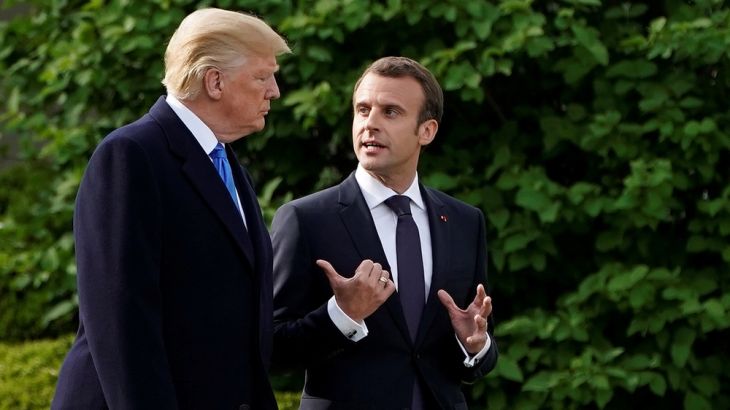France’s Macron urges Trump not to abandon Iran nuclear deal
French president uses speech to joint session of Congress to defend 2015 deal and push back on ‘America First’ agenda.

Emmanuel Macron has used his speech to a joint session of Congress to urge the United States to reject nationalism and preserve the Iran nuclear deal.
The French president received a three-minute standing ovation as he arrived in the chamber in Washington, DC on Wednesday, yet his speech was critical of President Donald Trump‘s America First agenda.
Keep reading
list of 4 itemsGabriel Attal becomes France’s youngest prime minister
Macron says protecting civilians ‘non-negotiable’ at Gaza aid conference
Macron visits Kazakhstan on strategic tour of Central Asia
He expressed doubt that Trump would stay in the nuclear deal and warned the West not to “repeat past mistakes” in the Middle East.
Saving the Iran deal has been high on the agenda of Macron’s visit, and he has presented Trump with a supplementary pact that would further limit Iran’s development of ballistic missiles and curb its military role in the region.
France, the US as well as Russia, Germany, China, the UK and the European Union are signatories to the agreement with Iran.
“My view – I don’t know what your president will decide – is that he will get rid of this deal on his own, for domestic reasons,” Macron said.
|
|
In an address to the US Congress earlier in the day, Macron said while the 2015 nuclear agreement “may not address all concerns”, the parties to the deal “should not abandon it without having something more substantial instead”.
“We signed it at the initiative of the United States. We signed it – both the United States and France. That is why we cannot say we should get rid of it like that.”
Macron added: “What we decided, together with your president, is that we can work on a more comprehensive deal addressing all these concerns.”
While declaring France’s position to stay with the Iran deal, Macron sought to allay the concerns of Trump and his conservative allies, declaring: “Iran shall never possess any nuclear weapon. Not now, not in five years, not in 10 years, never.”
Isolationism criticised
In his speech, Macron also made a pointed criticism of “isolationism, withdrawal and isolationism”, adding that the US “invented multilateralism”.
“It can be tempting to us as a temporary to remedy to our fears,” he said.
“But closing the door to the world will not stop the evolution of the world.
“It will only inflame the fears of our citizens. We have to keep our eyes wide open to the new risks right in front of us.”
|
|
Since Trump came to office in January 2017, he has taken several steps to block the nuclear deal.
In October, he refused to certify that Iran is living up to the accord. He also targeted several Iranian businesses and individuals with new sanctions.
On January 12, Trump announced he was waiving the US sanctions for the “last time“.
He said if his demands are not met within 120 days, the US would withdraw from the deal.
The deadline is on May 12, although he has hinted that the US could cut loose before that date.
Trump also appointed several members of his cabinet who oppose the nuclear deal, including Mike Pompeo, the incoming secretary of state, and John Bolton, the national security adviser.
Under the deal signed in Vienna in 2015, Iran scaled back its uranium enrichment programme and promised not to pursue nuclear weapons.
Secondary sanctions
In exchange, international sanctions were lifted, allowing it to sell its oil and gas worldwide.
However, secondary US sanctions remain.
The sanctions waiver and certification on Iran’s compliance, issued by the US every few months, were meant to allay American apprehension over the deal, while easing concerns among foreign businesses who want to invest in Iran.
In Iran on Wednesday, President Hassan Rouhani rejected proposals to change the deal, saying his country “will not add anything to the deal or remove anything from it, even once sentence.
“The nuclear deal is the nuclear deal”.
|
|